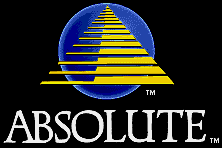Difference between revisions of "Absolute Entertainment"
From Sega Retro
m (Text replacement - "Third-Party Development Companies" to "Third-party development companies") |
|||
| (14 intermediate revisions by 4 users not shown) | |||
| Line 1: | Line 1: | ||
| − | {{ | + | {{CompanyBob |
| logo=Absolute_logo.png | | logo=Absolute_logo.png | ||
| − | + | | founded=1986-08-19{{ref|http://gdri.smspower.org/wiki/index.php/Absolute_Entertainment}} | |
| − | | founded=1986 | + | | defunct=1995-11{{ref|http://gdri.smspower.org/wiki/index.php/Absolute_Entertainment}} |
| − | | defunct=1995 | ||
| tseries=T-86 | | tseries=T-86 | ||
| − | | | + | | headquarters=251 Rock Road, [[wikipedia:Glen Rock, New Jersey|Glen Rock, New Jersey]], 07452, United States{{magref|egrn|8|20}}{{fileref|SummerCES1991 Directory.pdf|page=127}} |
| − | | | + | | headquarters2=[[wikipedia:Upper Saddle River, New Jersey|Upper Saddle River, New Jersey, United States]] |
| − | | | + | }}{{stub}}'''Absolute Entertainment, Inc.''' was an American video game publisher and affiliate of closely-related developer [[Imagineering]]. |
| − | }} | ||
| − | '''Absolute Entertainment''' was | ||
| − | The company was formed in 1986 by former [[Activision]] employees Dan and Garry Kitchen, Alex Demeo, John Van Ryzin and David Crane. While the company was based in New Jersey, | + | ==Company== |
| + | Absolute Entertainment was based in Glen Rock, New Jersey and later in Upper Saddle River, New Jersey. Through its development house [[Imagineering]], Absolute Entertainment produced titles for the [[Amiga]], [[Atari 2600]], Atari 7800, [[Sega Game Gear]], [[Sega Mega Drive]], [[Sega CD]], [[Game Boy]], [[Nintendo Entertainment System]], and [[Super Nintendo Entertainment System]] video game consoles, as well as for the [[PC]]. It also released games for the [[Sega Master System]] in Europe. | ||
| + | |||
| + | The company was formed in 1986 by former [[Activision]] employees Dan and Garry Kitchen, Alex Demeo, John Van Ryzin and [[David Crane]]. While the company was based in New Jersey, Crane worked out of his home on the West Coast. The company's name was chosen because it was alphabetically above Activision, implying that Absolute Entertainment was superior to Activision (it was the same strategy that Activision chose when the programmers left Atari). The company saw a number of badly received titles towards 1995, and after a series of failures in video game sales, the founding fathers finally pulled the plug on Absolute Entertainment later that year. | ||
==Softography== | ==Softography== | ||
| − | + | {{CompanyHistoryAll|Absolute Entertainment}} | |
| − | |||
| − | |||
| − | |||
| − | |||
| − | |||
| − | |||
| − | |||
| − | |||
| − | |||
| − | |||
| − | |||
| − | |||
| − | |||
| − | |||
| − | |||
| − | |||
| − | |||
| − | == | + | ==External links== |
| − | * | + | *[http://gdri.smspower.org/wiki/index.php/Absolute_Entertainment Absolute Entertainment] at [http://gdri.smspower.org Game Developer Research Institute] |
| − | |||
| − | |||
| − | |||
| − | + | ==References== | |
| + | <references /> | ||
Latest revision as of 08:53, 19 October 2022

| ||||
| Absolute Entertainment | ||||
|---|---|---|---|---|
| Founded: 1986-08-19[1] | ||||
| Defunct: 1995-11[1] | ||||
| T-series code: T-86 | ||||
Headquarters:
|
This short article is in need of work. You can help Sega Retro by adding to it.
Absolute Entertainment, Inc. was an American video game publisher and affiliate of closely-related developer Imagineering.
Contents
Company
Absolute Entertainment was based in Glen Rock, New Jersey and later in Upper Saddle River, New Jersey. Through its development house Imagineering, Absolute Entertainment produced titles for the Amiga, Atari 2600, Atari 7800, Sega Game Gear, Sega Mega Drive, Sega CD, Game Boy, Nintendo Entertainment System, and Super Nintendo Entertainment System video game consoles, as well as for the PC. It also released games for the Sega Master System in Europe.
The company was formed in 1986 by former Activision employees Dan and Garry Kitchen, Alex Demeo, John Van Ryzin and David Crane. While the company was based in New Jersey, Crane worked out of his home on the West Coast. The company's name was chosen because it was alphabetically above Activision, implying that Absolute Entertainment was superior to Activision (it was the same strategy that Activision chose when the programmers left Atari). The company saw a number of badly received titles towards 1995, and after a series of failures in video game sales, the founding fathers finally pulled the plug on Absolute Entertainment later that year.
Softography
Master System
- R.C. Grand Prix (1989)
Mega Drive
- Garry Kitchen's Super Battletank: War in the Gulf (1992)
- Toys (1993)
- David Crane's Amazing Tennis (1993)
- The Adventures of Rocky and Bullwinkle and Friends (1993)
- Goofy's Hysterical History Tour (1994)
- ESPN Sunday Night NFL (1994)
- Home Improvement (unreleased)
- Penn & Teller's Smoke and Mirrors (unreleased)
- Turn and Burn: No-Fly Zone (unreleased)
Game Gear
- R.C. Grand Prix (1993)
- Star Trek: The Next Generation: The Advanced Holodeck Tutorial (1994)
- Star Trek Generations: Beyond the Nexus (1994)
- Garry Kitchen's Super Battletank: War in the Gulf (2001)
Mega-CD
- A/X-101 (1994)
- Wheel of Fortune (1994)
- ESPN Sunday Night NFL (1994)
- Jeopardy! (1994)
- RDF: Global Conflict (1994)
- Battletech: Gray Death Legion (unreleased)
- Penn & Teller's Smoke and Mirrors (unreleased)
- Super Battletank 2 (unreleased)
Saturn
- Battletech: Gray Death Legion (unreleased)